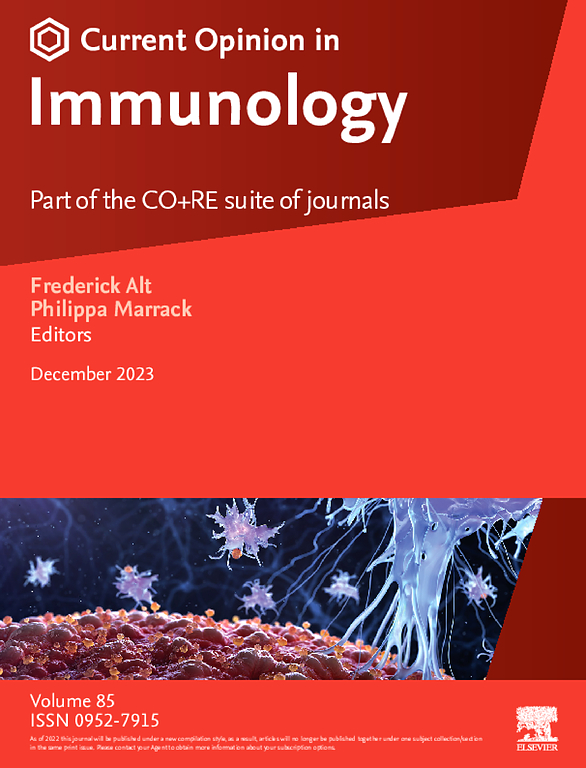Thetis cells: regulators of intestinal immune tolerance
IF 5.8
2区 医学
Q1 IMMUNOLOGY
引用次数: 0
Abstract
Our body’s mucosal surfaces interface with the external environment and are potential sites of entry for pathogens as well as noxious substances. Yet, these barrier sites are also colonized with symbiotic microbes and are in contact with harmless environmental antigens. Different barrier epithelia harbor distinct microbial communities that shape both the epithelial layer and local immune cells that maintain tissue homeostasis and tolerance to symbiotic microbes. This seemingly paradoxical peaceful co-existence of immune cells and microbes has fascinated immunologists for decades: how does the immune system balance inflammatory and tolerogenic responses? The mechanisms underlying peripheral immune tolerance to harmless foreign antigens have been most widely studied within the intestine, where the immune system must establish and maintain tolerance to harmless food and commensal antigens. Dysregulated immune responses to these antigens are linked to several human diseases, including inflammatory bowel disease, celiac disease, and food allergy. Understanding the cellular and molecular cues that promote intestinal immune tolerance is key to the development of effective therapeutic strategies for these pathologies. Here, we review recent insights into mechanisms of intestinal tolerance with a focus on recently identified RORγt+ antigen-presenting cells.
Thetis细胞:肠道免疫耐受的调节因子
我们身体的粘膜表面与外界环境接触,是病原体和有害物质的潜在进入点。然而,这些屏障位点也被共生微生物定植,并与无害的环境抗原接触。不同的屏障上皮含有不同的微生物群落,形成上皮层和局部免疫细胞,维持组织稳态和对共生微生物的耐受性。免疫细胞和微生物的这种看似矛盾的和平共存几十年来一直吸引着免疫学家:免疫系统是如何平衡炎症和耐受性反应的?外周免疫耐受无害外来抗原的机制在肠道内得到了最广泛的研究,在肠道内,免疫系统必须建立并维持对无害食物和共生抗原的耐受。对这些抗原的免疫反应失调与几种人类疾病有关,包括炎症性肠病、乳糜泻和食物过敏。了解促进肠道免疫耐受的细胞和分子线索是开发有效治疗这些病理的关键。在这里,我们回顾了最近对肠道耐受机制的见解,重点是最近发现的RORγt+抗原呈递细胞。
本文章由计算机程序翻译,如有差异,请以英文原文为准。
求助全文
约1分钟内获得全文
求助全文
来源期刊
CiteScore
13.30
自引率
1.40%
发文量
94
审稿时长
67 days
期刊介绍:
Current Opinion in Immunology aims to stimulate scientifically grounded, interdisciplinary, multi-scale debate and exchange of ideas. It contains polished, concise and timely reviews and opinions, with particular emphasis on those articles published in the past two years. In addition to describing recent trends, the authors are encouraged to give their subjective opinion of the topics discussed.
In Current Opinion in Immunology we help the reader by providing in a systematic manner: 1. The views of experts on current advances in their field in a clear and readable form. 2. Evaluations of the most interesting papers, annotated by experts, from the great wealth of original publications.
Current Opinion in Immunology will serve as an invaluable source of information for researchers, lecturers, teachers, professionals, policy makers and students.
Current Opinion in Immunology builds on Elsevier''s reputation for excellence in scientific publishing and long-standing commitment to communicating reproducible biomedical research targeted at improving human health. It is a companion to the new Gold Open Access journal Current Research in Immunology and is part of the Current Opinion and Research(CO+RE) suite of journals. All CO+RE journals leverage the Current Opinion legacy-of editorial excellence, high-impact, and global reach-to ensure they are a widely read resource that is integral to scientists'' workflow.

 求助内容:
求助内容: 应助结果提醒方式:
应助结果提醒方式:


